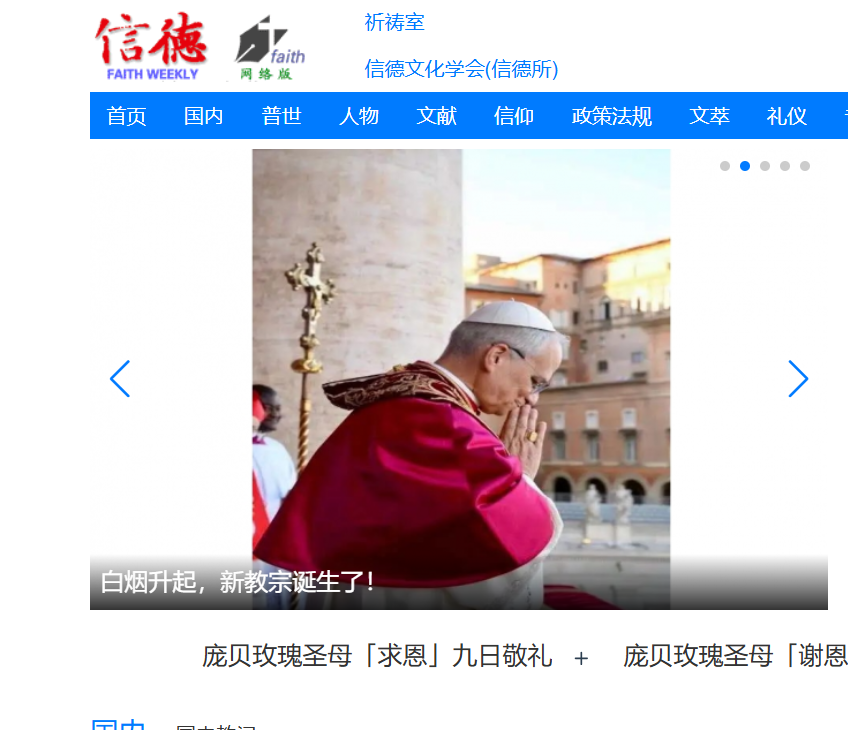Congratulations from Beijing, but no news on official Catholic websites
As with the death of Pope Francis, the Catholic entities controlled by the Communist Party of China kept publicly within diplomatic boundaries, unlike Catholic communities who were joyful for their new pastor. The issue of the two bishops elected in recent weeks will be the first test for the new pontiff. In a statement, Taiwanese President Lai expressed hope that his country and the holy See can promote peace and justice together.
Milan (AsiaNews) – China’s Catholic communities have reacted to the election of Leo XIV to the throne of Peter like they did a few days ago in the wake of the death of Pope Francis on 21 April.
The official reaction this time was quicker than three weeks ago. Since the election of Pope Leo XIV took place when it was night in China, the Xinhua news agency reported in the early morning the reaction of the Chinese Catholic Patriotic Association (CCPA) and the Council of Chinese Bishops, two official entities controlled by the Party, both of which “congratulated Pope Leo XIV on his election as the new pope,” presumably with a message whose content was not made public.
Later, during the usual daily press conference – centred today on Xi Jinping’s visit to Moscow for the celebrations marking the 80th anniversary of the victory against Nazi Germany in the Second World War, China’s Foreign Ministry spokesman Lin Jian answered a question from a journalist from the AP agency on the election of the pope.
“We congratulate Cardinal Robert Prevost on his election as the new pope,” he said. “We hope that under the leadership of the new pope, the Vatican will continue to have dialogue with China in a constructive spirit, have in-depth communication on international issues of mutual interest, jointly advance the continuous improvement of the China-Vatican relations and make contributions to world peace, stability, development and prosperity.”
Once again, China’s official reaction was limited to state-to-state level. However, neither the CCPA nor China’s various dioceses have posted for now any reaction on their website or WeChat profile. This sadly suggests that no Chinese bishops will likely attend Pope Leo XIV’s inaugural Mass on 18 May, as they were a no-show for Francis’s funeral.
This is quite different from the reactions among ordinary Chinese Catholics and their priests who, just as they did with the death of Pope Francis, publicly expressed their feelings, of joy this time. In many churches today, the name of the new pontiff was already included in the canon of the Mass.
As a non-government Catholic website, Xinde has greater leeway, and so followed the conclave, and posted a bio of Card Robert Prevost. Suggestively, it also published an article about the devotion to Our Lady of Guadalupe, patron saint of the Americas.
In the background, the election of two new bishops during the period of papal sede vacante, Fr Wu Jianlin as auxiliary bishop of Shanghai and Fr Li Jianlin as bishop of Xinxiang, in Henan province, remains an open question.
As reported last week, their election will be a testing ground in the coming months for the Sino-Vatican agreement on episcopal appointments, which was renewed for the third time last October.
For his part, Taiwanese President Lai Ching-te sent his congratulations to the newly elected pontiff, saying that his country hopes to strengthen existing ties with the Holy See to promote peace and justice.
The Vatican is one of only 12 states with formal diplomatic relations with Taiwan. Probably to avoid tensions with the mainland, President Lai chose not to attend Pope Francis’s funeral, sending instead a former vice president, the Catholic Chen Chien-jen, in his place.







.png)










